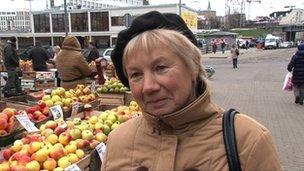Latvia heads for eurozone despite wary population
- Published

"I don't support joining the euro, because the eurozone is unstable," says Daina, wearing a French beret and snugly wrapped in a winter coat at Riga's Central Market.
She smiles at the thought of buying groceries with euros instead of Latvian lats, as if it's a joke.
"Sooner or later it will split anyway," she says.
Latvia is pushing ahead with plans to become the 18th member of the eurozone on 1 January 2014.
That's despite unemployment in the region being at an all-time high, Spain and Portugal struggling to bring their debt and deficits under control, and Greece's long-term future in the currency still in doubt.
A young mother, 28-year-old Annie, shields her eight-month-old daughter, Francesca, from the cold breeze and voices her concerns.
"It's better for us to wait and see what happens," she says. "I don't want to leave our national currency. Prices will probably go up."
According to a recent opinion poll, more than half the population is against joining the single currency.
Many worry that food will become more expensive. The prospect of contributing to bailouts for richer eurozone countries is also unpopular.
'Trade boost'
Latvian Prime Minister Valdis Dombrovskis says he understands people's concerns.
"The public now is less convinced than it was a few years ago," he says.
"It's not surprising because what you hear about the eurozone is all crisis. It is the task of the government to use all of its economic reasoning to show why it's still a good idea for Latvia to join."
He argues joining the euro will boost trade, reduce transaction costs, improve foreign investment and make travel easier.
All EU countries, except the UK and Denmark, are obliged by treaty to adopt the euro at some stage.
But several of those still outside the currency are looking to delay. In neighbouring Lithuania, a party has just won elections promising to put back euro entry from 2014 to 2015.
But Latvia's currency has been pegged to the euro since 2005 and Mr Dombrovskis argues that joining is the next natural step.
"We see the euro is holding remarkably well in its exchange rate to the US dollar: it's maintaining its share as a global reserve currency," he says.
"Therefore we see the euro as a currency doing well. We are sticking to the plan to join in 2014."
Latvia is an exception to the rule in other ways, too.
In the wake of the 2008 financial crisis, Latvia received a bailout from the European Union and the IMF, and the government introduced a tough austerity programme.
There was an extremely deep recession and GDP collapsed by 18% in just one year.
Even so, Mr Dombrovskis was re-elected and he has now written a book about how Latvia got out of its financial crisis.
Latvia's economy is certainly growing quickly again. Last year its GDP was up by 5.5%.
But critics say it is growing from a low base. They highlight the unemployment rate in the country, which remains high, and the number of people who seek employment abroad.
Sinking ship
Businesses also seem split over the economic benefits of joining the euro.
At the Kaija fish processing plant by the coast, Scottish-caught mackerel flop along a mechanical conveyor belt to be washed before nimble-fingered workers cut and stuff the fish into tins, some of which are exported back to the UK.
Andris Bite, a director at Kaija said: "It's not the correct time to join.
"It is a big risk to jump on a ship which could be sinking. It would be better to join the eurozone once the storm has calmed down."
At the Latvijas Finieris plywood factory, forklift trucks whizz along, shifting wooden panels to giant chopping machines. The company's corporate development manager, Gatis Kepitis, holds the opposite opinion.
"Joining the eurozone would be good for our company and other exporters because it reduces currency transaction costs and risks, and in general makes export transactions easier," he says.
Latvia remains the third poorest country in the EU and Brussels will decide early next year whether its economy is fit enough to join the single currency.
Morten Hansen, an economist from the Stockholm School of Economics in Riga, feels Latvia's euro aspirations, on balance, are right.
He says: "There are people talking about the last passengers entering the Titanic, but I would still say the euro will forever be seen as a more stable and credible currency than the Latvian lat."